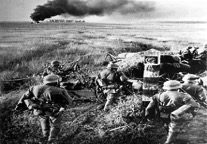Many things contributed to the fall of the Nazi Regime. People argue that Nazi ideals led to the failure of their plan for European dominance. Some say that it was the concept of “Lebensraum,” the need of living space for Germans, and others point out that the loss of World War II by Nazi Germany led to their downfall. All of these factors are true, but if we look deeper and focus in on some of the events that Nazi Germany took part in during World War II, we can pin the failed invasion of the Soviet Union, known as Operation Barbarossa, as one of the key contributing factors to the demise of Nazi Germany and everything the country stood for. This operation was an “all or nothing” operation, which meant that failure was not an option for Nazi Germany. Operation Barbarossa led to German Soldiers holding the fate of their country in their own hands as the very existence of Nazi Germany was at stake.1
In 1925 Hitler wrote the famous book Mein Kampf, which contained Hitler’s political beliefs and his plans for Germany. Hitler believed that Slavs were not part of the Aryan race, and he deemed them inferior. Mein Kampf emphasized the need for German living space, otherwise known as “Lebensraum.” To achieve this, the Germans would have to turn towards the East and focus on the Soviet Union, which would result in Hitler fighting a war on two fronts.2
The Germans began preparations as early as February 1941, anticipating that the invasion would commence during mid-May of 1941. However, due to the Balkan campaign, the date was pushed back to June 1941. The five-week delay shortened the time available to invade the Soviet Union. Hitler predicted a swift invasion, lasting only a few months, because of his rapid success in other parts of Europe. However, these successes led to Hitler being over confident, because he believed he was a political and military genius. Hitler didn’t anticipate war during the Soviet winter, and German soldiers lacked the adequate clothing and supplies to fight a war during the winter months. This would prove to be fatal to the German army as they were not prepared. On the other hand, the Soviets were also inadequately prepared. Although they had more numbers than their German counterparts, they lacked equipment or had poor quality equipment, and had worse training than the Germans. The quickly coming winter and with the Soviets lacking equipment and training, it was essential that the Germans achieved a quick victory.3

The initial offensive started June 22,1941. There were around four million German troops along with hundreds of thousands of Italian and Romanian troops. The Germans split themselves into three army groups, turning their focus to different parts of the Soviet Union. Army Group North would head to Leningrad, Army Group Center would head towards Moscow which was the Soviet capital. Army Group South would head south into Ukraine which was the center for Soviet industry and mining and had sufficient farmland for Hitler’s concept of “Lebensraum.” The Soviet south was also very rich with petroleum which was another deciding factor in the invasion. At first the invasion along the 1,800 miles took everyone in the Soviet army by surprise as the Germans were able to catch the Soviets unprepared.4
The first few weeks of the invasion were swift and fast, but by mid-July a series of rainstorms slowed the German advance deep in the Soviet Union. The rainstorms made the path treacherous for the Germans as the dirt and sandy roads turned muddy, making it difficult for German wheeled vehicles to advance. The Nazi Army made little progress with their offensive. Soviet troops would often do as much as they could to slow down the German advance, which included them burning crops, destroying bridges, and evacuating factories as they retreated. Furthermore, steel and munition plants in the West were destroyed and shipped to the East. The Soviets also destroyed most of their rail stock, depriving the Germans of use of the railroad system. Despite the Soviets doing everything in their power to slow the German attack, it still wasn’t enough, and by mid-July, the Germans had advanced more than 400 miles. The Germans were only 200 miles west of Moscow, the Soviet capital. There was still time to make significant advances before the onset of winter, but the opportunity broke down when Hitler and his generals had disagreements on where the German army would shift its focus to next. A quick victory was still essential to the German Army.5

Ultimately, after the Battle of Vyazma, which was a twenty-day battle that led to a German victory, the Germans had a clear path to Moscow. Moscow was not only the capital and largest city of the Soviet Union, but it was also one of the main military and political objectives for the Axis powers during the invasion. In early December 1941, the Germans were at the gates of Moscow with many of the troops exhausted and tired. Many of the Soviet forces were fresh, yet the Germans were so close to Moscow, it was hard to resist advancing to capture Moscow. Victory was in the Soviets’ sight, especially because of the onset of winter in the Soviet Union, which is one of the coldest countries in the world. The Germans suffered greatly during this harsh Soviet winter. The sub-zero temperatures were the most severe in decades. Frostbite decimated German troops, many of whom were already exhausted or had fallen ill due to the temperatures. Provisions were also not made for the German troops. They had very little clothing for the winter because Hitler and his generals thought the invasion would be swift. Many troops starved or froze to death. The freezing temperatures also immobilized many of the Germans’ transportation, artillery, and aircraft. In addition, many of the German supply lines were vulnerable to attacks from behind. Getting provisions to the troops up front was a difficult task for the Germans. The number of casualties the Germans faced were unheard of among the Nazis, as they barely had any losses in their previous campaigns during this war. The Soviets’ experience with the poor weather differed from the Germans. The weather was perfect for the Soviet Red Army as they were used to it and tended to fight better in freezing temperatures. 6

The turning point for Operation Barbarossa came as the drive to Moscow started to stall. The Soviets were poised for a counter offensive and were able to exploit the Germans when on December 6th, 1941, Gen. Georgy Zhukov of the Soviet Union launched a counter offensive against the Germans that the German army was never able to come back from. Many of the troops used in the counter offensive were Siberian troops who were very effective fighting in colder weather. This counter offensive drove the Germans away from Moscow and ultimately pushed them back all the way to Berlin. 7
So this leads back to the question of whether Operation Barbarossa was Hitler’s biggest failure that cost Nazi Germany World War II? The short answer would be yes, but to expand on this, we can see that Hitler and his generals made many mistakes and mishaps. Their goal to invade and overtake the Soviet Union was unrealistic from the beginning. The only reason why success seemed realistic was the fact that before Operation Barbarossa, Germany was dominating Europe and they weren’t experiencing any significant losses in these battles. The German Army was a war machine that was decimating their enemies. For this very reason Hitler and his generals grew overconfident. They were so confident they thought Operation Barbarossa wouldn’t be a long invasion and that there weren’t going to be many casualties. However, Hitler’s thinking was wrong. The Germans experienced more casualties on the Eastern front fighting the Soviets than they did on any other front. Overconfidence led Hitler to make irrational decisions for the German Army that made them not only lose the war, but also it led to a turning point in which Hitler would lose Germany as he knew it. Winter played a huge part as many of the German preparations were not geared towards fighting during the winter months. The Soviets were better suited to fight during the winter than the Germans. Without proper clothing, provisions, and other equipment needed to wage a war during the Soviet winter, Germany began to struggle towards their demise. Ultimately, Hitler was so obsessed with “Lebensraum” that he couldn’t grasp the consequences if he had failed. However, all of what Hitler had hoped for Germany would be gone by the time Germany fell to the Soviet Union.8
- Martijn Lak, “Operation Barbarossa and Germany’s Defeat in the East,” German History, Volume 29, Issue 2 (June 2011): 335–337. ↵
- H.W. Koch, “Operation Barbarossa-The Current State of the Debate,” The Historical Journal 31, no. 2 (1988): 388-390. ↵
- Britannica Encyclopedia, s.v. “Operation Barbarossa,” by John Graham Royde-Smith. ↵
- David M. Glantz, Operation Barbarossa:Hitler’s Invasion of Russia 1941(The History Press: Stroud, UK, 2011), 31-42. ↵
- Wikipedia, 2018, s.v. “Operation Barbarossa.” ↵
- Wikipedia, 2018, s.v. “Operation Barbarossa.” ↵
- Britannica Encyclopedia, s.v. “Operation Barbarossa,” by John Graham Royde-Smith. ↵
- Robert Smith Thompson & Alan Axelrod, Nazi Germany(New York;2018), 240-251. ↵



53 comments
Emily Jensen
Prior to reading this article I had never even heard of Operation Barbarossa. I can’t believe that Hitler forgot about the winter, especially as far north as the Soviet Union! It is no surprise that the weather was a major factor in them having to retreat. Sending in his troops in unprepared was a huge mistake on the dictator’s part.
Jabnel Ibarra
Operation Barbarossa is one of those perfect examples of what not to do when it comes to military strategy during wartime which can be summarized into one sentence: do not invade Russia during the winter. Like Napoleon before him, Hitler seemed to deeply underestimate the cruelty of a Russian winter and what it can do to even a well trained army.
Mia Stahl
When one thinks of what they most often think of bullets and bombs being the cause of the mass destruction of troops. It is incredible to think that in this particular scenario, one of the most important battle for the Germans, that weather was such a large factor in the victory that the Soviets had. In this particular instance, it is what eventually lead to the down fall of one of the most awful regimes to ever occur.
Tessa Bodukoglu
this was a very informative article. I personally have never heard of this before and didn’t know this is what basically took down the Germans. there was a lot of information given to me in this article to help me read and comprehend. i thought it was very interesting how neither one of them had the required materials but thy still fought.
Rebecca Campos
Hitler has what we like to call the hamartia of hubris. This means that Hitler’s fatal flaw was excessive pride. This is ultimately means that because Hitler was so obsessed with the idea of winning and creating this “extra space for Germans” that he ultimately ended up failing. The author did a good job going into detail about the war and the preparation that the German army either had or lacked. Hitler was so dead set on this master plan that no matter what stood in his way he wanted to achieve his goal and ultimately since he failed to see the errors in his plans, then fell through.
Noah Bolhuis
Operation Barbarossa was a very foolish thing that Hitler had his army attempt. Fight a war on two fronts is essentially the same as fighting two wars at once, and they were fighting a superpower at both sides. No matter how ignorant Hitler was in invading Russia during the winter, I am sure the world is grateful, as this act was more than likely the main reason Germany surrendered when it did.
Robert Rees
Pride cometh before the fall. I’ve heard the stories of Germany’s failed invasion of Russia almost as many times as I have heard that the Allies won World War II, yet it is always interesting to hear. This whole invasion is really a comedy of errors when you analyze it. The Russians were horribly underprepared to face the Axis army, yet Germany failed to capitalize soon enough on this golden opportunity, which meant one of Russia’s more unpleasant aspects, winter, was one of its greatest resources in fending off the invading forces.
Robert Freise
The brutal fighting that happened between the Russians and the Germans. From the history that I have learned is that Stalinggrad was one of the most bloody battles of WW2 and that both sides of the Germans and Russians were very brutal and unforgiving to each other. This article really gives a great picture of how important the Russian pressure was on Nazi Germany, It split up Germany into two fronts which helped the Invasion of Normandy.
Lamont Traylor
It’s surprising to see that the strong German army of the Nazi era failed to invade anything. Hitler and his Blitzkrieg seemed unstoppable for the most part. I can understand though how they failed to invade the Soviet Union, in those times that would be as difficult as trying to invade the U.S. in today’s world. In other words, it would be impossible.
Irene Astran
I forget how important it is to factor in the environmental state will have on your troops. It is interesting to think how much more effective one army could have been because their bodies were well equipped to handle that kind of weather. I appreciate the pictures you used in the body of this article. It puts this all into perspective for the Texas students we have viewing this site.